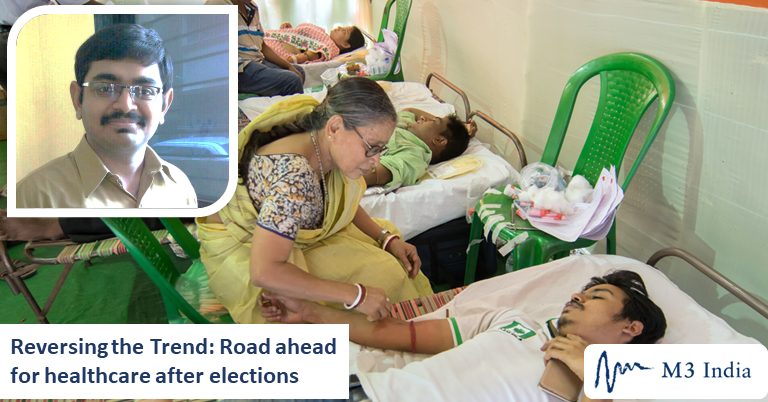Reversing the Trend: Road ahead for healthcare after elections by Dr. Soham D Bhaduri
M3 India Newsdesk Jun 04, 2019
Dr. Soham D Bhaduri picks up on the ambitious health schemes and initiatives the incumbent party which has returned to ruling after the recent elections had begun, questioning on how effective the implementation and public health governance will be in the years to follow.

The overwhelming mandate received by the Bhartiya Janta Party (BJP) in the 2019 general elections restates the faith of the Indian electorate in the incumbent’s vision and intent – unlike the opposition which could only weakly articulate its case leading up to the polls. The disillusionment with, and the backlash against, decades of dynastic and exclusionary politics became palpable after the election results, as also a fervent spirit of nationalism that was advanced as the main electoral theme by the incumbent party. And as a general mood to modify the old ways seems to erupt across the country, one hopes that our inveterate neglect of public health and its consequent stagnation would also be swept away by a gust of fresh air.
As ambitious as some of the announcements related to health have been in the BJP’s previous tenure, one could argue that a lot is left to be desired on the ground. And perhaps, after having greatly enchanted the masses with initiatives such as Swachhata Abhiyaan and Ayushman Bharat through fabulous promotional campaigns, the next five years will be judged solely on the basis of how well they actually deliver. Multiple challenges are therefore, forecast.
Starting with the Ayushman Bharat-National Health Protection Scheme, the biggest challenges will be to mobilize enough public funds for it to live up to the scale envisioned for it – and to cultivate a degree of regulatory robustness that allays concerns about exploitation by the private sector and cements trust. As a step forward towards universal health care, gradual but steady expansion beyond the present ‘poorest 40% of the population’ cap can be a great way of obtaining additional funds in the form of premiums. Further, greater and greater integration with existing government schemes including the ESI, CGHS, and the plethora of state insurance plans will not only be indispensable to create a truly national health insurance framework, but will also test the spirit of co-operative federalism.
The Swachh Bharat Abhiyaan and the Mission Indradhanush vaccination initiative, of which the former is fast approaching its deadline, have recorded impressive success in so far as their nature as a ‘mission’ is concerned. Further consolidation of gains already made and ensuring long-term sustainability will now be the challenge. It will require greatly expanding the ranks of grass-roots functionaries and test our commitment to strengthening primary health care. Also, the strong governance and the robust international standing of India, which the incumbent party assumes credit for, will be put to test when it comes to reducing verticalization of various health programmes and diverting more of external support towards strengthening the general health system.
Another challenge will be to pass the National Medical Commission (NMC) bill 2017, which seeks to replace the corruption-tainted Medical Council of India (MCI) by the NMC. While the MCI has now been superseded by the Board of Governors as a temporary measure, it needs to be remembered that a similar step was also taken in 2010 and extended till three years afterwards, only for the MCI to be reconstituted again. Continued opposition of this bill by the organised medical profession will need to be adeptly tackled.
Finally, overall development and mainstreaming of Indian systems of medicine will reflect greatly on the BJP’s commitment to the ideology of cultural nationalism. Strengthening AYUSH (Ayurveda, Yoga and naturopathy, Unani, Siddha, and Homeopathy) medical systems by increasing public investment and standardising and validating AYUSH medicine were focus of the 2014 BJP election manifesto – however, repeated attempts only to further subordinate these systems to modern medicine through bridge courses have been made in the name of training mid-level health providers, and in an attempt to somehow increase the numbers of qualified allopathic practitioners. True commitment to cultural nationalism will entail working towards a greater role of AYUSH systems in healthcare while acknowledging, preserving, and bolstering their individuality.
A chain is only as strong as its weakest link. Ever since independence, public health has craved much warranted attention and investment, and weak governance has often resulted in subordination of domestic public health concerns to international interests. Since the incumbent party has returned to power with a massive mandate on the promise of strong and effective governance, its performance in arguably the weakest area of public policy, namely public health, will serve as the litmus test of its claims.
Disclaimer- The views and opinions expressed in this article are those of the author's and do not necessarily reflect the official policy or position of M3 India.
Dr. Soham D. Bhaduri is Editor, The Indian Practitioner, a healthcare commentator, and a medical doctor based in Mumbai.
-
Exclusive Write-ups & Webinars by KOLs
-
Daily Quiz by specialty
-
Paid Market Research Surveys
-
Case discussions, News & Journals' summaries